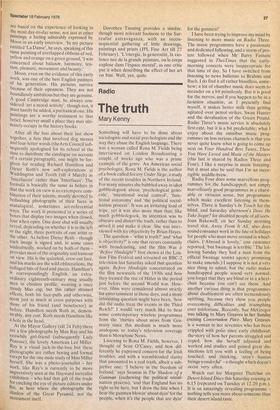Radio
The truth
Mary Kenny Something will have to be done about sociologists and social psychologists and the way they abuse the English language. There was a woman called Rona M. Fields being interviewed on London Broadcasting a couple of weeks ago who was a prime example of the genre. An American social psychologist, Rona M. Fields is the author of a book called Society Under Siege, a study of the recent troubles in Northern Ireland. For many minutes she babbled away in idiot gobbledegook about 'psychological genocide', 'intentional social control', 'functional autonomy' and 'the political socialisation process'. It was an irritating load of tripe, yet it was also more than that; like much gobbledegook, its intention was to obscure and distort the truth, rather than to unveil it and make it clear. She was interviewed with icy objectivity by Brian Hayes.
The question — 'what is truth?' and 'what is objectivity?' is one that recurs constantly with broadcasting, and the film Was it 'Before Hindsight'? first shown at the London Film Festival and screened on BBC-2
television last Saturday asked that question
again. Before Hindsight concentrated on
the film newsreels of the 1930s and how they treated the rise of Hitler in the period just before the second World war. How ever, films were considered almost strictly for entertainment in those days, and a more interesting question might have been, 'how
did the radio treat the events in the Third
Reich?' I would very much like to hear some contemporary wireless programmes from the 'thirties about news from Get: many since this medium is much more analogous to today's television coverage than is Movietone News.
Listening to Rona M. Fields, however, I thought of Sean O'Casey, and how differently he expressed concern for the Irish troubles, and with a warmblooded clarity that amounted to a real truth, albeit a subjective one: 'I believe in the freedom of Ireland,' says Seumas in The Shadow of a Gunman (eschewing the political socialisation process), 'and that England has no right to be here, but I draw the line when I hear the gunmen blowin' about dyin' for the people, when it's the people that are dyin'
for the gunmen!'
I have been trying to improve my mind by listening to more music on Radio Three. The music programmes have a passionate and dedicated following, and a storm of protest followed when Mr Barry Fantoni suggested in ThesTimes that the earlymorning concerts were inappropriate for that time of day. So I have switched from listening to news bulletins to Brahms and Bach. I do find it all rather bloodless, somehow; a lot of chamber music does seem to meander on a bit pointlessly. But it is good for the nerves, and if you happen to be in a lactation situation, as I presently find myself, it makes better milk than getting agitated over petrol ,strikes, Swan Hunter and the devaluation of the Green Pound. Radio Three's music service is absolutely first-rate, but it is a bit predictable; what I enjoy about the omnibus music programmes on less serious channels is that you never quite know what is going to come up next on Your Hundred Best Tunes, These You Have Loved and Music of the Masters (this last is shared by Radios Three and Four). I like a surprise in music listening; but it must also be said that I'm an incorrigible middle-brow. Radio. Four does some marvellous programmes for the handicapped; not simply marvellously good programmes in a charitable or virtuous sense, but programmes which make excellent listening in themselves. There is Sunday's In Touch for the blind, and Saturday afternoon's Does He Take Sugar? for disabled people of all ;sorts. Joan Bakewell, on her Sunday morning travel slot, Away From It All, also does sound consumer work in the line of holidays for people who must move around in wheelchairs. ('Abroad is lovely,' one customer reported, 'but Swanage is terrible.' The following Sunday they had a man from the official Swanage tourist agency promising to make amends.) I suppose it is not a very nice thing to admit, but the radio makes handicapped people sound very normal; you forget that they are blind or in a wheelchair because you can't see them. And another curious thing is that programmes about disablement are often tremendously uplifting, because they show you people overcoming difficulties and triumphing over misfortune. Recently, Sue McGregor was talking to Mary Greaves in her Sunday evening Conversation Piece. Mary Greaves is a woman in her seventies who has been crippled with polio since early childhood; the.story of how her parents struggled and coped, how she herself adjusted and worked and studies and gained great distinctions left you with a feeling of being touched, and thinking, 'aren't human beings wonderful' — a thought which doesn't occur very often.
Watch out for Margaret Thatcher on Desert Island Discs this Saturday evening at 6.15 (repeated on Tuesday at 12.20 p.m.). It is an amazingly revealing programme — nothing tells you more about someone than their desert island taste.


































 Previous page
Previous page